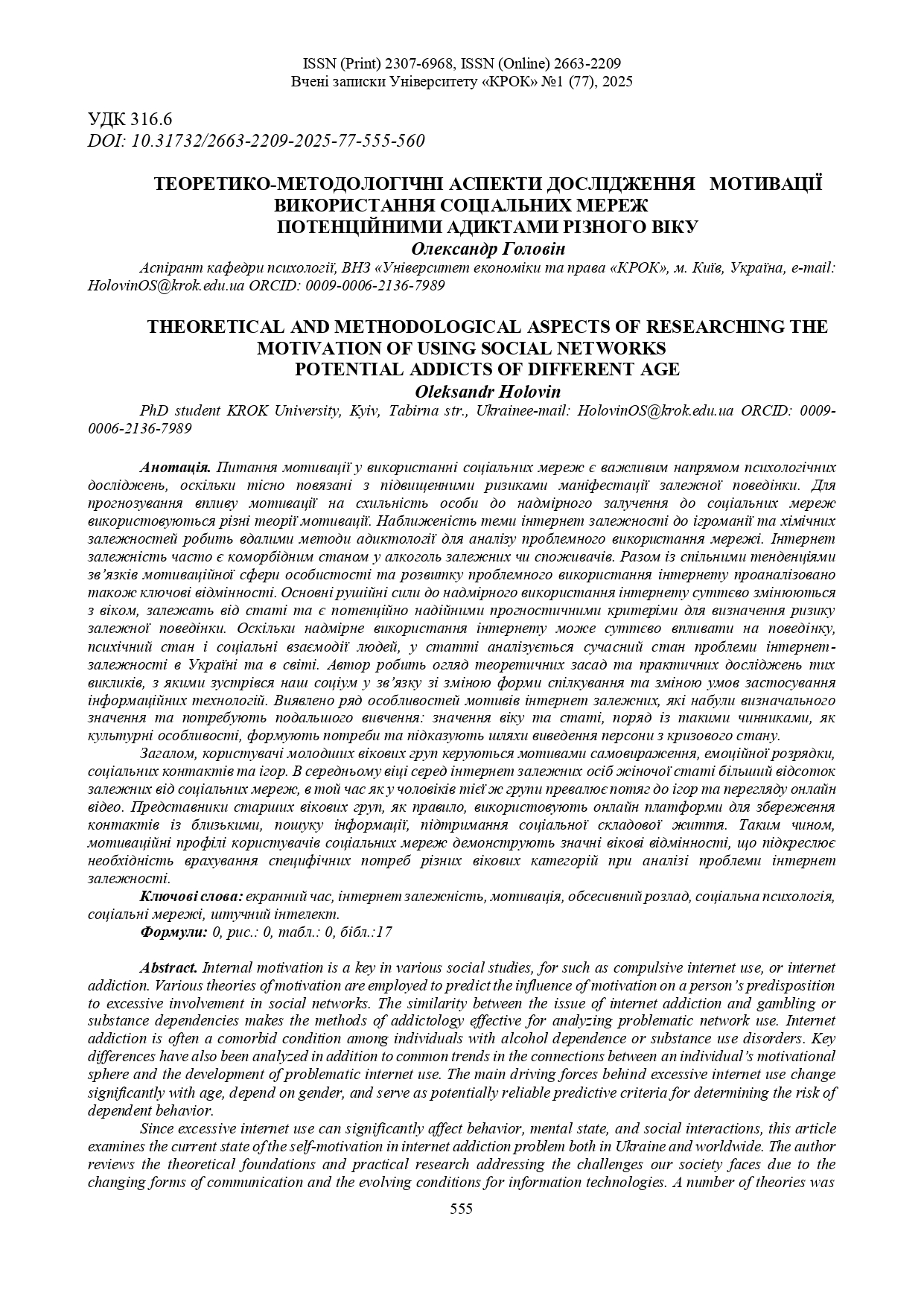THEORETICAL AND METHODOLOGICAL ASPECTS OF RESEARCHING THE MOTIVATION OF USING SOCIAL NETWORKS POTENTIAL ADDICTS OF DIFFERENT AGE
DOI:
https://doi.org/10.31732/2663-2209-2025-77-555-560Keywords:
Screen time, internet addiction, motivation, obsessive disorder, social psychology, social networks, artificial intelligenceAbstract
Internal motivation is a key in various social studies, for such as compulsive internet use, or internet addiction. Various theories of motivation are employed to predict the influence of motivation on a person’s predisposition to excessive involvement in social networks. The similarity between the issue of internet addiction and gambling or substance dependencies makes the methods of addictology effective for analyzing problematic network use. Internet addiction is often a comorbid condition among individuals with alcohol dependence or substance use disorders. Key differences have also been analyzed in addition to common trends in the connections between an individual’s motivational sphere and the development of problematic internet use. The main driving forces behind excessive internet use change significantly with age, depend on gender, and serve as potentially reliable predictive criteria for determining the risk of dependent behavior.
Since excessive internet use can significantly affect behavior, mental state, and social interactions, this article examines the current state of the self-motivation in internet addiction problem both in Ukraine and worldwide. The author reviews the theoretical foundations and practical research addressing the challenges our society faces due to the changing forms of communication and the evolving conditions for information technologies. A number of theories was mentioned in connection with motives of internet-dependent individuals — peculiarities that have become crucial and warrant further study: age and gender, along with factors such as cultural characteristics, shape needs and suggest pathways for guiding individuals out of a crisis state.
Overall, younger users are driven by motives such as self-expression, emotional release, social contacts, and gaming. In middle age, a higher percentage of internet-dependent women are addicted to social networks, whereas among men in the same age group, the inclination toward gaming prevails. Representatives of older age groups generally use online platforms to maintain contact with loved ones and to seek information. Thus, the motivational profiles of social network users show significant age differences, undelining the necessity of considering the specific needs and motivation of different age categories when analyzing the problem of internet addiction.
Downloads
References
Гаркуша, І. В., Кайко, В. І. (2019). Психологічні аспекти та основні мотиви використання соціальних мереж. Вісник університету імені Альфреда Нобеля, «Педагогіка і психологія»", 2(18), 40–50.
Гречановська, О. В., Мегема, О. М., Потапюк, Л. М. (2023). Вплив соціальних мереж на психологічний стан та самооцінку української молоді. Вчені записки Таврійського національного університету імені В.І. Вернадського, том 34 (73), 4, 60–66.
Петрунько, О. В. (2010). Медіасоціалізація, або соціалізація з медіа замість соціалізації з дорослими. Психологічні перспективи: Спеціальний випуск, 103–113.
Петрунько, О. В., Сілаєва, О. В. (2023). Інтернет-залежність як адикція сучасної людини. Вчені записки Університету «КРОК», 3(71), 115–124.
Петрунько, О. В., Телешун, К. О. (2022). Інтернет-залежність дорослих користувачів та можливості її профілактики. Вчені записки Університету «КРОК», 4(68), 91–99.
Колеснікова, Т. В., & Сингаївська, І. В. Психологічні передумови формування іміджу сучасної жінки в соціальних мережах. Держава, регіони, підприємництво: інформаційні, суспільно-правові, соціально-економічні аспекти розвитку: тези доповідей ІІ Міжнародної конференції (Київ, 20 листопада 2020 р.). К. : Університет "КРОК", 2020. С. 44–46.
Andreassen, C. S., Torsheim, T., Brunborg, G. S., & Pallesen, S. (2012). Development of a Facebook Addiction Scale. Psychological Reports, 110 (2), 501–517.
Castells, M. (2010). The rise of the network society. Chichester: John Wiley & Sons, 97–99.
Deci, E. L., & Ryan, R. M. (1985). Intrinsic Motivation and Self-Determination in Human Behavior. New York, Plenum Press, 43–49.
Gray, J. A. (1982). The Neuropsychology of Anxiety: An Enquiry into the Functions of the Septo-Hippocampal System. Oxford University Press, 305–317.
Joinson, A. N. (2008). Looking at, looking up or keeping up with people? Motives and use of Facebook. Proceedings of the SIGCHI Conference on Human Factors in Computing Systems, 1026–1037.
Kuss, D. J., & Griffiths, M. D. (2011). Online Social Networking and Addiction – A Review of the Psychological Literature. International Journal of Environmental Research and Public Health, 8(9), 3528–3552.
Oppenauer, C. (2009). Motivation and needs for technology use in old age. Gerontechnology, 8(2), 82–87.
Skinner, B. (1988). The behavior of organisms. Journal of the Experimental Analysis of Behavior, 119–126.
Subrahmanyam, K., Greenfield, P. (2008). Online communication and adolescent relationships. The Future of Children 18 (1), 119–146.
Young, K. (1998). Internet Addiction: The Emergence of a New Clinical Disorder. CyberPsychology & Behavior, 1(3), 237–244.
Young, K. (1998). Caught in the Net: How to Recognize the Signs of Internet Addiction and a Winning Strategy for Recovery. New York: John Wiley & Sons, 98–113.

Downloads
Published
How to Cite
Issue
Section
License

This work is licensed under a Creative Commons Attribution-NonCommercial 4.0 International License.

